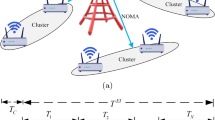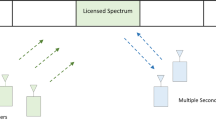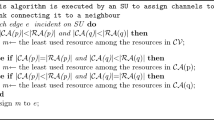Abstract
This paper considers a cognitive radio (CR) system in non-ideal fading wireless channels and proposes cooperative spectrum sensing schemes based on coherent multiple access channels (MAC), serving as an alternative way to improve the cooperative spectrum sensing performance and provide space diversity for spectrum sensing. Sufficient statistics are transmitted using a common channel from the secondary users (SUs) to a fusion center (FC) where the global decision is obtained. The optimal scaling factors of the proposed schemes are obtained by maximizing the detection probability under a target false alarm probability and a transmit power constraint. Because the proposed optimal MAC scheme has high computational complexity, a sub-optimal solution based on maximization of the deflection coefficient (DC) is also proposed. Simulation results show that the proposed algorithms can significantly improve the spectrum sensing performance and approach the detection baseline.
Similar content being viewed by others
References
Letaief K B, Zhang W. Cooperative communications for cognitive radio networks. Proc IEEE, 2009, 97: 878–893
Jun M, Zhao G D, Li Y. Soft combination and detection for cooperative spectrum sensing in cognitive radio networks. IEEE Trans Wirel Commun, 2008, 7: 4502–4507
Ganesan G, Li Y. Cooperative spectrum sensing in cognitive radio, part I: two user networks. IEEE Trans Wirel Commun, 2007, 6: 2204–2213
Laneman J N, Tse D, Wornell G W. Cooperative diversity in wireless networks: efficient protocols and outage behavior. IEEE Trans Inf Theory, 2004, 50: 3062–3080
Liu K, Gamal H E, Sayeed A. Decentralized inference over multiple-access channels. IEEE Trans Signal Process, 2007, 55: 3445–3455
Liu K, Sayeed A. Type-based decentralized detection in wireless sensor networks. IEEE Trans Signal Process, 2007, 55: 1899–1910
Xiao J J, Cui S G, Luo Z Q, et al. Linear coherent decentralized estimation. IEEE Trans Signal Process, 2008, 56: 757–770
Berger C R, Guerriero M, Zhou S L, et al. PAC vs. MAC for decentralized detection using noncoherent modulation. IEEE Trans Signal Process, 2009, 57: 3562–3575
Kay S M. Fundamentals of statistical signal processing: detection theory. Upper Saddle River, NJ: Prentice-Hall, 1998
Wang J Z, Chen J. Performance of wideband CDMA with complex spreading and imperfect channel estimation. IEEE J Sel Area Comm, 2001, 19:152–163
Wang J Z, Milstein L B. CDMA overlay situations for microcellular mobile communications. IEEE Trans Commun, 1995, 43: 603–614
Boyd S, Vandenberghe L. Convex Optimization. Cambridge: Cambridge Univ, 2003
Author information
Authors and Affiliations
Corresponding author
Rights and permissions
About this article
Cite this article
Chen, Z., Zhang, X. & Yang, L. Optimal MAC based cooperative spectrum sensing in cognitive radio networks. Sci. China Inf. Sci. 55, 1388–1396 (2012). https://doi.org/10.1007/s11432-012-4568-9
Received:
Accepted:
Published:
Issue Date:
DOI: https://doi.org/10.1007/s11432-012-4568-9




